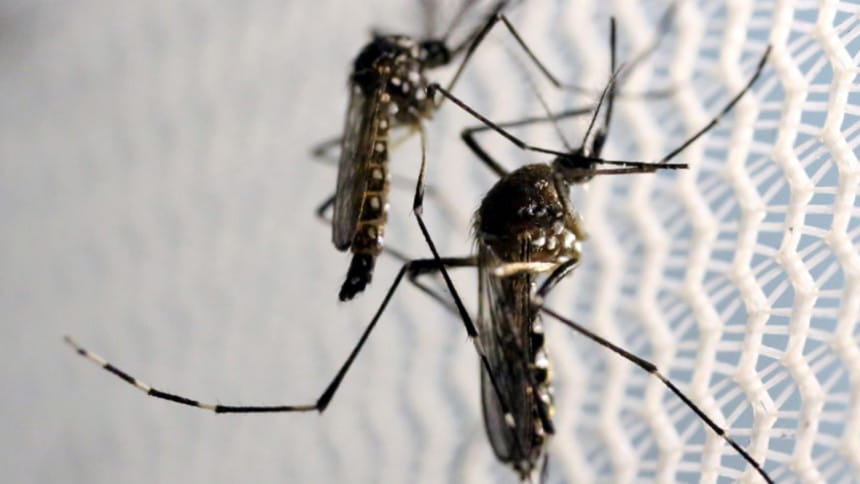Zika risk on rise

The risk of Zika infection in the country is rising with the strong presence of its transmitter, Aedes mosquito, and its outbreak in Singapore and Malaysia where some eight lakh Bangladeshis work.
The danger is more than what was conceived since 80 percent of Zika cases are asymptomatic, making it difficult for health officials to initiate checkups at ports, and also because the virus is transmitted through sexual intercourse, epidemiologists said.
At least 19 were identified as Bangladeshi among the 369 Zika-infected people in the city state of Singapore until September 18. Six other cases have been found in Malaysia, according to media reports.
Besides, Aedes mosquitoes that transmit dengue virus here are also responsible for the transmission of Zika.
Some 2,757 Dengue cases were reported in Dhaka until September 22, which is the highest during this time since 2007, according to the Institute of Epidemiology, Disease Control and Research (IEDCR).
Medical experts earlier said it was mostly the South American countries like Brazil that had cases of Zika, and so Bangladesh had little risk with thin traffic from the region to Bangladesh.
Now that the Asian countries having large numbers of Bangladeshi migrants face Zika outbreaks, some of them are much likely to carry the virus home, they said.
The virus can be transmitted by Aedes mosquitoes after they bite someone carrying it from abroad or someone infected with it from the environment, said Professor Saif Ullah Munshi of the virology department at Bangabandhu Sheikh Mujib Medical University (BSMMU).
“We have not conducted any survey to check if Zika virus is here in Bangladesh, but it was found in the environment in India. So, it is not unlikely that Zika virus is also here in Bangladesh,” he told The Daily Star.
Even if it is not found locally, the risk of its import has increased with the Zika outbreaks in Singapore and Malaysia, he said.
There is no vaccine or treatment for Zika infection that causes mild fever, rash and red eyes.
The recent-time Zika outbreak was first detected in Brazil last year and has since spread across America and the Caribbean.
Pregnant women are considered to be at greatest risk because the virus can cause severe birth defects, including microcephaly marked by small head and underdeveloped brains.
In Brazil, Zika has been linked to more than 1,800 cases of microcephaly.
Prof AKM Shamsuzzaman, director (communicable disease control) of the Directorate General of Health Services (DGHS), said the government had ordered medical teams in all international air, sea and land ports to keep careful watch on incoming travellers from the affected countries.
Thermal scanners are installed at the ports for health screening, he said.
Cards are also given to passengers in planes to be filled up so that they can report the countries they are travelling from and if they have any symptom, Dr Shamsuzzaman added.
Since 80 percent of the infected people are asymptotic, highest efforts should be put into preventing breeding of mosquitoes, said Prof Munshi of the BSMMU.
Prof Meerjady Sabrina Flora, director at the IEDCR, said the authority had adequate surveillance and screening arrangements. There is nothing to be panicked but public awareness has to be built, she added.
The health ministry has advised pregnant women not to travel to the Zika-affected countries.
Measures to destroy mosquitoes are imperative, Sabrina said, adding that all should use mosquito repellents or nets to prevent mosquito biting.
The World Health Organisation advised men and women returning from the Zika-affected countries to have safer sex or not have sex for six months, regardless of whether they are trying to conceive or showing symptoms.
It said it had found evidence of Zika transmission from asymptomatic males to their female partners and a symptomatic female to her male partner, as well as evidence that Zika is present in semen for longer than thought.
The authorities will arrange orientation for gynecologists so they screen pregnant women in case Zika infection is suspected, Dr Sabrina said.

 For all latest news, follow The Daily Star's Google News channel.
For all latest news, follow The Daily Star's Google News channel. 



Comments